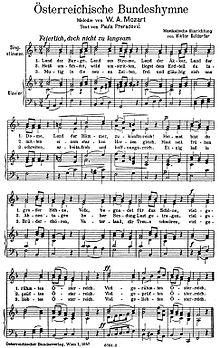I
Land der Berge, Land am Strome,
Land der Äcker, Land der Dome,
Land der Hämmer, zukunftsreich!
Heimat großer Töchter und Söhne,
Volk, begnadet für das Schöne,
𝄆 Vielgerühmtes Österreich! 𝄇
II
Heiß umfehdet, wild umstritten,
Liegst dem Erdteil du inmitten
Einem starken Herzen gleich.
Hast seit frühen Ahnentagen
Hoher Sendung Last getragen,
𝄆 Vielgeprüftes Österreich. 𝄇
III
Mutig in die neuen Zeiten,
Frei und gläubig sieh uns schreiten,
Arbeitsfroh und hoffnungsreich.
Einig laß in Jubelchören,
Vaterland, dir Treue schwören.
𝄆 Vielgeliebtes Österreich. 𝄇 |
1
[lant dɐ ˈbɛɐ̯.gə lant am ˈʃtrɔ.mə]
[lant dɐ ˈɛ.kɐ lant dɐ ˈdɔ.mə]
[lant dɐ ˈhɛ.mɐ ˈt͡sʊ.kʊnft͡s.raɪ̯ç]
[ˈhaɪ̯.mat ˈgrɔ.sɐ ˈtœx.tɐ ʊnt zøː.nə]
[fɔlk ˈbɛg.na.dət fyːr das ˈʃøː.nə]
𝄆 [ˈfiːl.gɐ.yːm.təs ˈøːs.tɐ.raɪ̯ç] 𝄇
2
[haɪ̯s ˈuɱ.feː.dɛt vɪlt ˈum.striː.tn̩]
[ˈliːkst deːm ˈeːɐ̯.taɪ̯l dʊ ˈiːn.mɪ.tn̩]
[ˈaɪ̯.nəm ˈʃtar.kn̩ ˈhɛɐ̯.t͡sn̩ ˈglaɪ̯ç]
[hast zaɪ̯t ˈfryː.ən ˈaː.nən.ta.gən]
[ˈhoː.ɛɐ̯ ˈzɛn.dʊŋ last ˈgɛ.tra.gən]
𝄆 [ˈfiːl.gə.pryːf.təs ˈøː.stɐ.raɪ̯ç] 𝄇
3
[ˈmʊ.tɪç iːn diː ˈnoʏ̯.ən ˈt͡saɪ̯.tn̩]
[fraɪ̯ ʊnt ˈgloʏ̯.bɪç ziː ʊns ˈʃraɪ̯.tn̩]
[ˈar.baɪ̯t͡s.froː ʊnt ˈhɔf.nuːŋs.raɪ̯ç]
[ˈaɪ̯.nɪç las iːn ˈjʊ.bəl.køː.rən]
[ˈfaː.tɐ.lant diːr ˈtroʏ̯.ə ˈʃvøː.rən]
𝄆 [ˈfiːl.gə.liːp.təs ˈøː.stɐ.raɪ̯ç] 𝄇 |
I
Land of peaks, oh, land of rivers,
Land of fields, oh, land of steeples
Land of labours, future-bound!
Home thou art to prodigious kin,
Shining brighter than ever been
𝄆 Austria, of high praise! 𝄇
II
Bold if battered, ne'er torn nor tattered
Stands thou strong midst Europe fettered
For thee art pledges saith!
Since days long past, verily thou hast
Trials of heated temper pas't
𝄆 Austria, of true faith. 𝄇
III
Joyfully jaunting, future-bound,
As one nation, safe and sound,
In high spirits newly found!
All together now, in jubilation
To thee, we pledge with animation
𝄆 Austria, dearly loved! 𝄇 |
